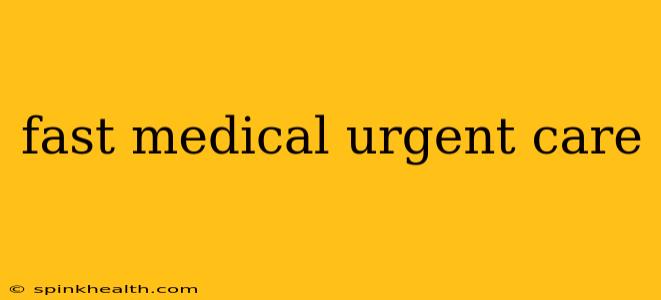Life throws curveballs. One minute you're enjoying a sunny afternoon, and the next, you're facing a sudden illness or injury that needs immediate attention. But navigating the healthcare system quickly can feel overwhelming. That's where fast medical urgent care steps in, offering a crucial bridge between your primary care physician and the emergency room. This comprehensive guide will explore what urgent care is, when you should use it, and how to find the best option for your needs.
What is Fast Medical Urgent Care?
Imagine a healthcare setting that's faster than a traditional doctor's appointment yet less intense than a hospital emergency room. That's the essence of urgent care. It's designed to handle non-life-threatening medical issues that require prompt attention but aren't severe enough for an emergency room visit. Think sprains, minor cuts, flu-like symptoms, or ear infections. Urgent care centers prioritize speed and efficiency while maintaining a high standard of medical care. The goal is to get you seen, diagnosed, and treated quickly, getting you back to your life as soon as possible.
When Should I Go to Urgent Care?
This is a crucial question, and the answer often hinges on the severity of your condition. While urgent care is excellent for many situations, it's not a substitute for emergency services. Here's a quick guide to help you decide:
Go to Urgent Care if you experience:
- Minor injuries: Sprains, strains, cuts, burns (minor), and simple fractures.
- Illnesses: Flu, strep throat, bronchitis, urinary tract infections, and common colds (when severe).
- Wounds requiring stitches: If the wound isn't excessively deep or bleeding profusely.
- Allergic reactions: Mild to moderate allergic reactions (excluding those requiring immediate epinephrine).
- Other non-life-threatening conditions: Minor respiratory issues, rashes, and headaches (when severe).
Go to the Emergency Room if you experience:
- Life-threatening conditions: Chest pain, severe bleeding, difficulty breathing, stroke symptoms, or loss of consciousness.
- Severe injuries: Major trauma, deep wounds, severe burns, or penetrating injuries.
- Severe allergic reactions: Difficulty breathing, swelling of the face or throat, or severe hives.
How Long is the Wait Time at Urgent Care?
The wait time at an urgent care facility can vary significantly depending on several factors: time of day, day of the week, and the number of patients currently being seen. Generally, urgent care aims for shorter wait times than emergency rooms, often within an hour or less. However, during peak hours, you might experience a slightly longer wait. Many urgent care centers now offer online check-in, allowing you to register in advance and potentially reduce your waiting time in the facility.
What Types of Services Does Urgent Care Offer?
Urgent care centers offer a broad spectrum of services, often exceeding what you might expect. While the focus is on non-life-threatening conditions, many facilities provide:
- Diagnostics: X-rays, blood tests, and other diagnostic tests to determine the cause of your illness or injury.
- Treatment: Treatment for a variety of conditions, from administering medication to providing wound care.
- Prescriptions: Many urgent care centers can provide prescriptions for common illnesses.
- Physical examinations: Routine check-ups (often outside of a primary care setting).
- Immunizations: Flu shots, and other vaccinations.
What is the Cost of Urgent Care?
The cost of urgent care varies depending on your insurance coverage, the services provided, and the location of the facility. It's advisable to contact the urgent care center directly or check with your insurance provider to understand your out-of-pocket expenses. Generally, urgent care visits are often less expensive than emergency room visits.
Finding the Right Fast Medical Urgent Care Near Me
Locating a suitable urgent care facility is crucial. Most people search online using terms like "urgent care near me" or "fast medical urgent care near me." Online search engines often provide maps, reviews, and contact information, allowing you to quickly find a nearby center that meets your needs. Consider reading online reviews to gauge patient experiences before selecting a facility.
In the fast-paced world we live in, access to quick and efficient medical care is vital. Understanding the nuances of urgent care empowers you to make informed decisions when facing unexpected health concerns. Remember, while urgent care is a valuable resource, it's crucial to know when to seek emergency medical attention. Your health is paramount, so always prioritize your well-being.

